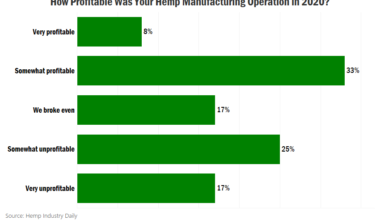Starting a cannabis business is far from simple.
Evolving regulations and the unique challenges presented by federal marijuana prohibition mean entrepreneurs must navigate a complex business landscape.
If you’re looking to enter the cannabis industry, here are five steps to get your business venture off the ground.
1. Master cannabis regulations
This is the challenging step.
Cannabis laws vary dramatically by state, and sometimes even by city or county.
What’s legal in one place might be strictly prohibited just a few miles away.
Before you think about developing a business plan, you must:
- Understand federal vs. state law: Cannabis remains federally illegal in the United States, which creates significant hurdles for banking, taxation and interstate commerce. You need to be fully aware of these discrepancies.
- Deep dive into state and local regulations: Research your state’s cannabis program. Understand licensing requirements, zoning restrictions for your chosen location, cultivation limits, packaging and labeling rules, testing mandates and advertising guidelines.
- Consult legal professionals: Engage an attorney specializing in cannabis law. They can help you interpret complex regulations, navigate the licensing process and ensure ongoing compliance.
2. Define your cannabis business model
The cannabis industry offers a diverse range of business opportunities beyond just growing and selling. Your chosen model will dictate the specific regulations, capital requirements and operational complexities you’ll face.
Consider the range of options.
- Cultivation: This can range from small-scale indoor cannabis growing operations to large-scale outdoor marijuana farms.
- Processing/manufacturing: Creating products like edibles, concentrates, tinctures or topicals from raw cannabis.
- Dispensary/retail: Selling medical or recreational cannabis products directly to consumers.
- Distribution: Transporting cannabis products between licensed entities.
- Ancillary businesses: These businesses don’t always directly touch the plant but support the industry. Examples include:
- Packaging
- Security services
- Marketing and consulting
- Testing laboratories
- Hydroponic supply stores
Your skills, interests, capital and local market demand should all factor into your decision on which type of business you start.
3. Develop a business plan
A detailed business plan is crucial for any startup but especially in the highly regulated cannabis sector. It will serve as your roadmap and be essential for attracting investors. Your plan should cover:
- Executive summary: An overview of your business concept.
- Company description: What your business is, its mission and its values.
- Market analysis: In-depth research on your target audience, competitors and market trends.
- Organization and management: Your team, legal structure and key personnel.
- Products and services: A detailed description of what you’ll offer.
- Marketing and sales strategy: How you’ll reach customers, considering cannabis advertising restrictions.
- Operational plan: Everything from cultivation processes and inventory management to security protocols and quality control.
- Financial projections: Startup costs, revenue forecasts, operational expenses and a break-even analysis.
- Compliance plan: A detailed strategy for adhering to all relevant cannabis regulations.
4. Secure funding
Starting a cannabis business is capital-intensive. Licensing fees, real estate, equipment, security systems and initial inventory can quickly add up. Traditional financing can be challenging because of federal illegality, so explore diverse funding options:
- Personal savings and friends/family: Often the first source of capital for cannabis entrepreneurs.
- Angel investors and venture capitalists: Look for investors interested in the cannabis space.
- Private lenders: Some specialized lenders focus solely on cannabis businesses.
- Equipment financing: Loans specifically for purchasing necessary equipment.
- Crowdfunding: Certain platforms allow for cannabis-related ventures but be mindful of regulations.
Be prepared with a solid business plan and clear financial projections when approaching potential funders.
5. Navigate the licensing and application process
Once your business plan is in place and funding is within reach, the complex licensing process begins. This typically involves:
- Application submission: Completing extensive applications that often require detailed operational plans, security measures, financial disclosures and background checks.
- Fees: Paying significant application and licensing fees, which are often nonrefundable.
- Background checks: All owners and key personnel will undergo thorough background checks.
- Demonstrating compliance: You’ll need to prove your ability to meet all state and local regulations, including zoning, security and product testing.
- Site selection and approval: Securing a suitable location that complies with all zoning laws for cannabis businesses.
Subscribe to the MJBiz Factbook
Exclusive industry data and analysis to help you make informed business decisions and avoid costly missteps. All the facts, none of the hype.
What you will get:
- Monthly and quarterly updates, with new data & insights
- Financial forecasts + capital investment trends
- State-by-state guide to regulations, taxes & market opportunities
- Annual survey of cannabis businesses
- Consumer insights
- And more!
This process can be lengthy and challenging, requiring attention to detail and persistence.
Starting a cannabis business is a marathon, not a sprint. It demands extensive research, careful planning, significant capital and an understanding of an ever-evolving regulatory environment. However, for those prepared to navigate its complexities, the cannabis industry offers opportunities for growth and innovation.
(Note: AI assisted in summarizing the key points for this story.)
Medical Disclaimer:
The information provided in these blog posts is intended for general informational and educational purposes only. It is not a substitute for professional medical advice, diagnosis, or treatment. Always seek the advice of your physician or other qualified healthcare provider with any questions you may have regarding a medical condition. The use of any information provided in these blog posts is solely at your own risk. The authors and the website do not recommend or endorse any specific products, treatments, or procedures mentioned. Reliance on any information in these blog posts is solely at your own discretion.






